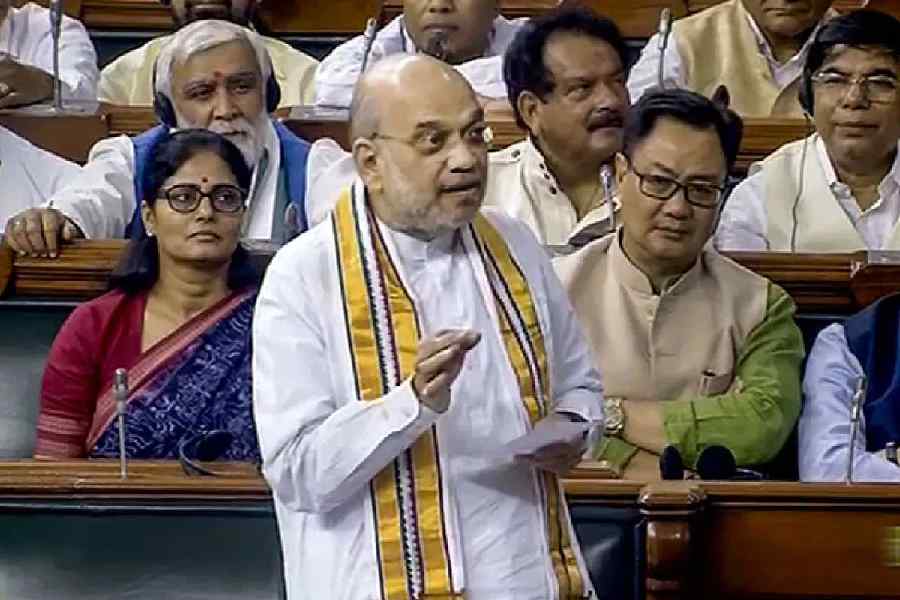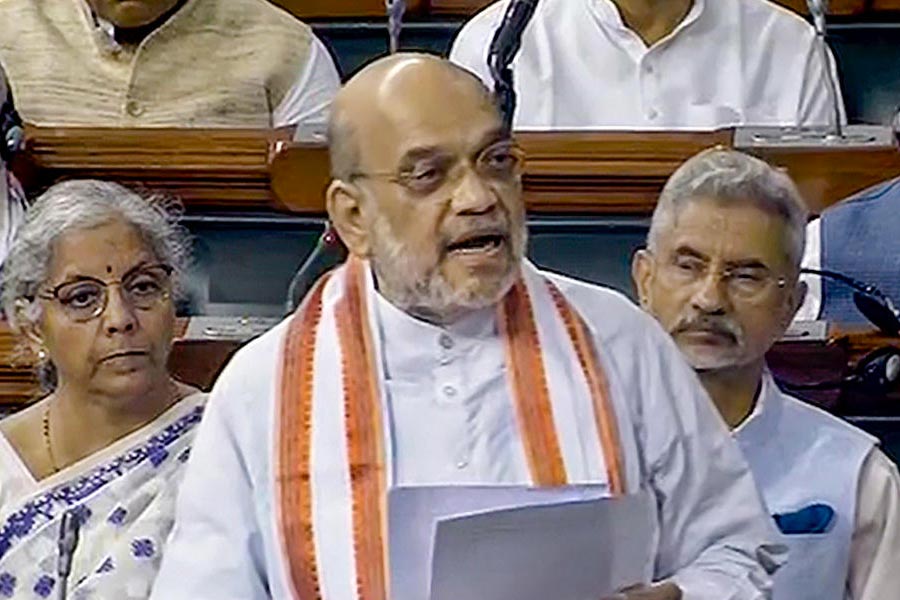Anyone endangering sovereignty or integrity of India may get a maximum punishment of life imprisonment while those involved in mob lynching and rape of minor may be given the maximum punishment of death sentence.These punishments are part of the three bills introduced by Union Home Minister Amit Shah in Lok Sabha
Anyone endangering sovereignty or integrity of India may get a maximum punishment of life imprisonment while those involved in mob lynching and rape of minor may be given the maximum punishment of death sentence.
These punishments are part of the three bills introduced by Union Home Minister Amit Shah in Lok Sabha on Friday.
The crime of murder will invite death sentence or life imprisonment while those involved in rape shall be punished with minimum 10 years of jail or imprisonment for life and gang rape will invite at least 20 years of imprisonment or imprisonment for the remainder of that person's natural life.
According to the bills, if a woman dies after the rape or it causes the woman to be in a persistent vegetative state, the convict shall be punished with rigorous imprisonment for a term which shall not be less than 20 years, but which may extend to imprisonment for life, which shall mean imprisonment for the remainder of that person's natural life, or with death.
Whoever commits rape on a girl under 12 years of age shall be punished with rigorous imprisonment for a term which shall not be less than 20 years, but which may extend to imprisonment for life, which shall mean imprisonment for the remainder of that person’s natural life, and with fine or with death.
The bills introduced in Lok Sabha are Bharatiya Nyaya Sanhita (BNS) Bill, 2023; Bharatiya Nagarik Suraksha Sanhita (BNSS) Bill, 2023; and Bharatiya Sakshya (BS) Bill, 2023 that will replace the Indian Penal Code, 1860, Criminal Procedure Act, 1898, and the Indian Evidence Act, 1872 respectively.
The home minister said the BNS Bill has provisions that seek to repeal sedition, and award maximum capital punishment for crimes such as mob lynching and rape of minors.
The government proposed to abolish the provision for sedition but brought it in a different avatar.
According to the proposed law, anyone purposely or knowingly, by words, either spoken or written, or by signs, or by visible representation, or by electronic communication or by use of financial mean, or otherwise, excites or attempts to excite secession or armed rebellion or subversive activities, or encourages feelings of separatist activities or endangers sovereignty or unity and integrity of India; or indulges in or commits any such act shall be punished with imprisonment for life or with imprisonment which may extend to seven years and shall also be liable to fine.
According to the existing law on sedition, anyone involves in the crime is punished with life imprisonment.
Those involved in terrorist act and if such offence has resulted in the death of any person will be punishable with death or imprisonment for life without the benefit of parole.
Whoever, by deceitful means or making by promise to marry to a woman without any intention of fulfilling the same, and has sexual intercourse with her, such sexual intercourse not amounting to the offence of rape, shall be punished with imprisonment of either description for a term which may extend to 10 years and shall also be liable to fine.
Shah said the changes were brought in to provide speedy justice and create a legal system that meets contemporary needs and aspirations of the people.
According to the proposed law, whoever commits murder shall be punished with death or imprisonment for life, and shall also be liable to fine.
When a group of five or more persons acting in concert commits murder on the ground of race, caste or community, sex, place of birth, language, personal belief or any other ground each member of such group shall be punished with death or with imprisonment for life or imprisonment for a term which shall not be less than seven years, and shall also be liable to fine.
Whoever, being under sentence of imprisonment for life, commits murder, shall be punished with death or with imprisonment for life, which shall mean the remainder of that person's natural life.
Anyone who commits culpable homicide not amounting to murder shall be punished with imprisonment for life, or imprisonment of either description for a term which shall not be less than five years but which may extend to 10 years, and shall also be liable to fine, if the act by which the death is caused is done with the intention of causing death, or of causing such bodily injury as is likely to cause death; or with imprisonment of either description for a term which may extend to ten years and with fine.
Whoever causes the death of any person by doing any rash or negligent act not amounting to culpable homicide shall be punished with imprisonment of either description for a term which may extend to seven years, and shall also be liable to fine.
Anyone who commits rape shall be punished with rigorous imprisonment of not less than 10 years, but which may extend to imprisonment for life, and shall also be liable to fine.
If a police officer or public servant or member of the armed forces commits rape, he shall be punished with rigorous imprisonment for a term which shall not be less than ten years, but which may extend to imprisonment for life.
Whoever, attempts to commit or commits an offence of terrorist act shall and if such offence has resulted in the death of any person, be punishable with death or imprisonment for life without the benefit of parole, and shall also be liable to fine which shall not be less than Rs 10 lakh.
Anyone involved in unlawful activity including kidnapping, robbery, vehicle theft, extortion, land grabbing, contract killing, economic offences, cyber-crimes having severe consequences, trafficking in people, drugs, human trafficking racket for prostitution or ransom by the effort of groups of individuals acting in concert, singly or jointly, either as a member of an organised crime syndicate or on behalf of such syndicate, by use of violence, threat of violence, intimidation, coercion, corruption or related activities or other unlawful means to obtain direct or indirect, material benefit including a financial benefit, shall constitute organised crime.
Whoever, attempts to commit or commits an offence of organised crime shall if such offence has resulted in the death of any person, be punishable with death or imprisonment for life and shall also be liable to fine which shall not be less than Rs 10 lakh.
If any person commits suicide, whoever abets the commission of such suicide, shall be punished with imprisonment of either description for a term which may extend to ten years, and shall also be liable to fine.
The bill also has provisions to provide first-time community service as one of the punishments for petty offences.












